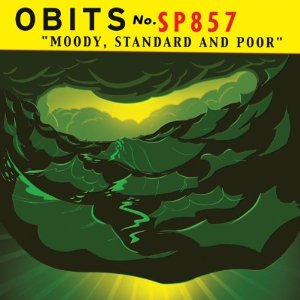Whoever said that rock & roll is a young man’s game? Over the last few years, some of the most vital, energetic new music has come courtesy of guys with thinner hair and thicker waistlines than your average indie icon. The Hold Steady, Nick Cave and James Murphy have all produced albums that are widely acknowledged as bona-fide classics, whilst the members of Disappears and Skull Defekts – responsible for two early-2011 favourites – have been playing in bands since before the likes of Wavves and Cloud Nothings were born. With Gil Scott Heron currently enjoying renewed critical acclaim at the age of 61, it seems as though those artists with a little more maturity are ready to show the youth of today that a little experience counts for a lot.
Rick Froberg, leader of Brooklyn-based rockers Obits, has more experience than most, having spent the past quarter-century in some of the most revered bands on the American alternative music scene (Pitchfork, Drive Like Jehu, Hot Snakes). His current band were signed to Sub Pop on the back of a bootleg recording of their first ever gig in 2008, and released their debut album, I Blame You, a year later. Follow-up Moody, Standard & Poor deviates very little from that record’s blueprint of stomping garage punk, but that’s kind of the point. When promoting I Blame You, Froberg stated “we’re not into innovation as a band; innovation is overrated.” He wasn’t kidding, but there’s a good reason why groups keep returning to this tried-and-tested musical formula: it’s a whole lot of fun, and when it sounds this good, more of the same is more than enough.
Obits occupy the space where the old and new schools of New York new wave meet, but it’s not hard to trace a line back through the ragged rock of the Replacements and the Stooges’ primal howl to the bluesy R&B rattle of early Stones and rollercoaster guitars of 60s surf bands like the Ventures. ‘You Gotta Lose’, ‘I Want Results’ and ‘Killer’ boast lean, metronomic drumming and angular hooks worthy of the Strokes, and there are several moments where Froberg and Sohrab Habibion’s interweaving guitars recall the majestic six-string duels between Tom Verlaine and Richard Lloyd on Television’s Marquee Moon, but there is also room for thunderous AC/DC riffs (‘No Fly List’), instrumental psych-outs (‘I Blame Myself’) and plenty of scrappy Nuggets-inspired garage-rock hip-shakers. It may not be original, but it’s certainly effective.
If Moody has a fault, it’s that it might just be too good at what it does, and although criticising an album for being technically flawless may be a bit nit-picky, it’s a valid point, as this kind of music – more than almost any other – is meant to be rough around the edges. It would be nice to hear a bit more of Hot Snakes’ recklessness, or some of the cerebral post-hardcore jamming that populated his Drive Like Jehu output, but Froberg mostly directs his band-mates as if teaching some sort of garage rock master-class, and although few would question his credentials it does occasionally feel slightly clinical. There are still plenty of cheap thrills on offer though; Moody, Standard & Poor proves these old dogs can still teach the young pups some pretty cool new tricks.


